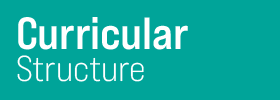You are here
Program Structure
The current curricular structure includes four semesters. During the first one, students must pass two Core courses, obtaining 12 SCT. In the second semester students must pass an Elective course and a Core course giving 12 SCT. Additionally, in the second semester, students must present the Preliminary Thesis Proposal (8 SCT), which allows more maturity and control for the development of the thesis. In the third semester students take the two remaining Elective courses (12 SCT), along with the Thesis Seminar (16 SCT). Finally, in the fourth semester students must complete their Thesis Project (30 SCT).
The organization of the program structure is customized as a Work Plan suitable for each student, which is prepared by the Supervising Professor together with the student. The Work Plan complies with a curricular track combining Core and Elective courses that contribute to the thesis development guideline formed by the Preliminary Thesis Proposal, the Thesis Seminar and the Thesis itself. The plan must integrate three Core courses, three Elective courses and the thesis development guideline.
Core courses:
- Advanced Thermodynamics
- Advanced Transport Phenomena
- Advanced Mass Transfer
- Chemical and Biochemical Reactors Analysis and Design
- Process Modeling and Simulation
- Numerical Solutions in Transport Phenomena
- Preliminary Thesis Proposal
- Thesis Seminar
- Thesis
Elective courses:
- Experimental Design and Statistical Analysis
- Special Topics of Drying
- Topics of Membrane Separation
- Process Optimization
- Intelligent Systems in Process Engineering
- Special Topics of Energy
- Advanced Process Control
- Non-Equilibrium Thermodynamics
- Mathematical Methods in Process Engineering
- Special Topics of Biotechnology
- Special Topics of Waste Treatment
- Biological Wastewater Treatment
- Ionic Liquids in Separation Processes
- Air Quality and Control of the Atmospheric Pollution
- Bioseparation Processes
- Special Topics in Computer Simulation
- Scientific Communication Methodology
- Life cycle and environmental analysis of Processes
Students may take elective subjects that are within the guidelines of their Degree Thesis, in other postgraduate programs at the University or outside of it. The foregoing must be ratified by his/her Tutor and authorized by the Director. The subjects must contain at least the same amount of SCT-Chile credits as the Core or Elective Subjects of the Program. In this regard, for the use of student mobility opportunities, international cooperation and the use of agreements, the University has the Department of International and Interuniversity Relations DRII.


